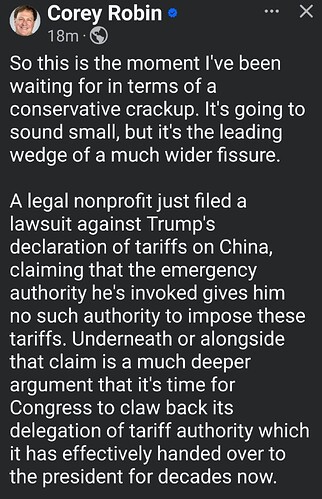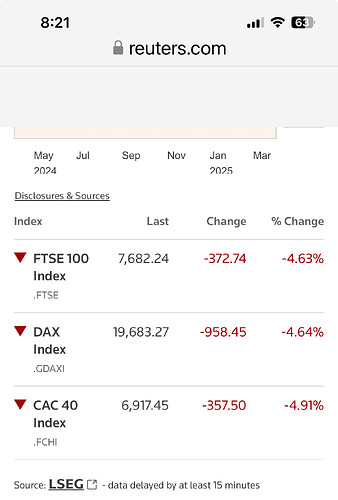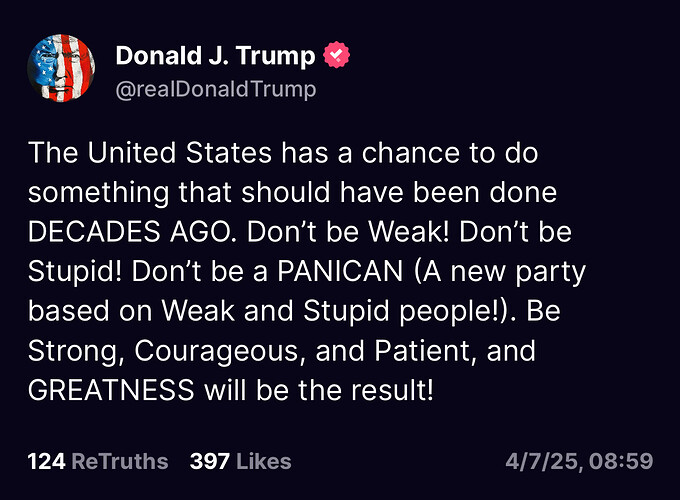As they point out down-thread, the successors are crazy, but only Drumf has a cult of personality surrounding him.
But here’s what is politically significant about this lawsuit: the nonprofit filing the suit is funded, in part, by Leonard Leo, the longtime leader of the Federalist Society. By most people’s estimations, Leo was the single most important architect for all of Trump’s justices on the Supreme Court and the overwhelming number of judges Trump appointed to the federal bench during his first term. Leo is the heart and soul of the conservative legal movement, the Principia of the judicial right. His nonprofit, named the New Civil Liberties Alliance (of course), was the force behind the Court’s overturning of the Chevron doctrine last year.
That this may be The Thing that splits the right will come as a disappointment to the left, which always thinks it ought to be some basic issue of human rights or fundamental constitutional morality that would break up the right. Good luck with that. The tariffs were always going to be the thing that broke up the right, for the very same reason tariffs were the leading edge of political conflict in the 19th century: because they implicate the entire political economy, and beyond the political economy, more foundational questions of power and control, which are always at the heart of every fundamental constitutional conflict.
I had thought the opposition to the tariffs would come from Senate Republicans, and that opposition is obviously brewing there (Democrats got four or five Republican senators to vote with them on a symbolic vote on the issue). But the Senate GOP is still way too reluctant to take on Trump. As is corporate America, which is positively terrified of him. But it’s very clear that this issue of the tariff, which is foundational to a big part of the right that is opposed to the tariffs, is something that Leo—and by implication all those Federalist Society judges he made happen—not only cares about a great deal but is willing to go to the mat over.
The irony is that conservative free traders have long wanted to give the president power over tariffs because they didn’t trust Congress to abide by the free-trade thing. Members of Congress, particularly in the House, were thought to be too close to the people and thus too parochial to defend the larger national interest in free trade (this is the right’s view). So better to give power over trade to the president. That’s changed with Trump, obviously, so now the tariff is going to be the major issue that leads the judicial right to confront the empowered executive that they’ve turbo-charged in so many other ways.
I know it’s perverse of me, but it’s kind of what I love about this country: these maximal foundational questions of major political morality always get pressed and pushed into what seem like these teeny-tiny questions of law and policy and institutional delegation. No one can ever explicitly argue the very big questions in this country, but they somehow know, in their weird legalese, how to conscript the tiniest questions to serve as instruments of those bigger questions. It’s bizarre and makes for a profound bad faith in our arguments. We’re never really arguing about what we care most about. But that makes our arguments so fascinating and furious. It’s like a family that argues over the stupidest things because it can’t argue over the real divisions at stake. Our super technical debates can never really support the full weight of what the protagonists in these debates are really arguing about. And they can’t admit that. But it does make the job of unpacking and interpreting those debates almost the equivalent of a psychoanalyst’s interpretation of a dream.
This… is a pretty accurate description of an LLM hallucinating…
The opposition is coming from the billionaires that fund Leo. They’re losing money and pissed off that they’re going to lose more money.
fuck
That’s his emotional support firearm.
Sane-washing of Trump in action, albeit in it’s most minor form:
Every news outlet:
Trump urges Americans to ‘hang tough’
Trump’s actual Truth Social post:
Although maybe it’s not that minor, given that “hang tough” is given as a direct quote by all these news outlets, and that’s literally not what he said.
(Then there’s the greater sanewashing that no one is even commenting on the insanity of his claiming that the tariffs, which were just announced, are somehow already creating jobs? Seriously?)
Look, I know people are looking for an explanation for Trump’s behaviour, but be careful when you start bandying around armchair mental health diagnoses. I’ve lost two relatives to dementia, and the one thing I can say with any certainty is that it does change personalities.
Without any official diagnosis, it’s safer to assume that Trump’s just a stupid, selfish, petty man.
Coming this fall on CBS, the Adventures of Hank Tough, Unqualified Private Eye!
He was here following the laws seeking asylum. He was not in a gang.
Hernandez Romero left his home country last May because he was targeted for being gay and for his political views, his attorney says. He made the long trek north through the Darien Gap, a 60-mile roadless stretch of dense forest between Colombia and Panama, to Mexico, where he eventually got an appointment to seek asylum in the United States. At a legal border crossing near San Diego, he was taken into custody while his case was processed.
Toczylowski said he had a strong asylum case. Hernandez Romero had what is known as a credible fear interview, the first step in the process of seeking asylum in the U.S.
“And the government had found that his threats against him were credible and that he had a real probability of winning an asylum claim,” Toczylowski said.
Could be dementia. Could be drugs. Or it could be just a perfect storm of stupidity, negligence, incompetence, sadism, and being a rich spoiled shithead who never had to know how to do anything and has always been insulated from the consequences of his actions. Or could be all of the above (that’s my own guess).
The important point is, Chump is completely disconnected from reality, has no idea what he’s doing and doesn’t care, as long as his ego is being stroked (or he thinks it is).
From the comments:
Then a question about this interesting development.
These parties may rise to oppose the tariffs—fine. So maybe prices won’t rise so much after all, and maybe there’s less economic damage across much of the world. But is there the least reason to think these parties will develop the least discomfort with the police state methods, the coercion of colleges, law firms, businesses, etc., the destruction of such social insurance as we have, the destruction of knowledge, the escalating environmental depredation?(Throw in a few more items from Projects 2025 — but this already suffices.) That question appears to answer itself. In fact they love all or nearly all of that stuff. If so, then what we get at best is an outright police state, on an express track to social and environmental disaster, where things aren’t as expensive as they might have been. In fact, were this strand of opposition somehow to neutralize Trump — let this be posited — the learned conservatives would replace him with someone with the same agenda except a better economist.
Admittedly an improvement over what we have. But …?
According to a D.C. source with knowledge of the plan that’s still being developed, Trump has commandeered Saturday, June 14—the 250th anniversary of the U.S. Army and, as it happens, Trump’s 79th birthday—for his military parade. It would stretch almost four miles from the Pentagon in Arlington to the White House, according to the source, who stressed that local officials are just learning of it.
$92 million dollars down the drain! One of the reasons for canceling it last time was that the heavy tanks would destroy the city streets.
An ego in a vacuum, existing only to be served. If only we could Futurama his head in a glass jar and then cut all the connections.
Speaking of the Chevron doctrine mentioned earlier in that post, Chevron is a really good example of this very thing. Chevron was decided in 1984, at the height of Reagan’s power. Prior to Chevron, administrative agencies still had some power to interpret and reinterpret laws and agency rules, but the federal courts had more of that power. At the time, the federal judiciary was still (barely) dominated by liberals, not conservatives. The Federalist Society was just two years old and Leonard Leo was still in high school. Reagan had just come in and transformed the administrative state. He didn’t do it quite as dramatically as Trump, but he definitely slashed a lot of regulations. Reagan and other conservative Republicans were worried about the judiciary undoing that work. They wanted that power (the power to interpret laws and rules) in the hands of the agencies, not in the hands of the courts. Thus Chevron, which was decided in their favor and allowed administrative agencies to interpret laws and rules which were ambiguous however they saw fit, as long as their interpretations were reasonable and logical. Fast forward to a few years ago, and the judiciary had changed a lot. Plus, Democrats seemed to have an advantage in Presidential elections, with Republicans only winning the popular vote once since 1988. Suddenly, conservatives don’t want that interpretive power in the hands of the agencies. They want it back in the courts, because the judiciary is dominated by conservatives. Thus, Loper Bright. So, both the original Chevron case, and the case that overturned it, were backed by conservatives.
- We contacted the 100 largest American companies and asked a simple question:
Do you support the tariffs announced by President Trump on April 2?
These are tariffs that have already destroyed trillions of shareholder value
NOT ONE COMPANY WOULD ANSWER THE QUESTION
Video of an incredible protest sign.


